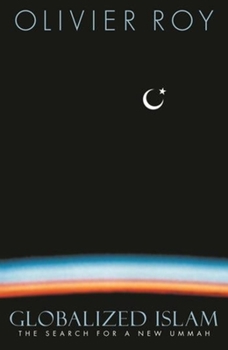Globalized Islam: The Search for a New Ummah
Select Format
Select Condition 
Book Overview
The spread of Islam around the globe has blurred the connection between a religion, a specific society, and a territory. One-third of the world's Muslims now live as members of a minority. At the heart of this development is, on the one hand, the voluntary settlement of Muslims in Western societies and, on the other, the pervasiveness and influence of Western cultural models and social norms. The revival of Islam among Muslim populations in the last...
Format:Paperback
Language:English
ISBN:0231134991
ISBN13:9780231134996
Release Date:March 2006
Publisher:Columbia University Press
Length:320 Pages
Weight:1.00 lbs.
Dimensions:0.5" x 5.5" x 8.4"
Customer Reviews
3 ratings
A new foundation for understanding modern Islam's sentiments and radicalism
Published by Thriftbooks.com User , 17 years ago
Globalized Islam: The Search for a new Ummah pinpoints growing Islam militancy not abroad but in the West, arguing that the revival of Islam among Muslims over the last few decades is more a force of the pressures of globalization than a reaction to the West. In moving beyond the traditional, more common ' East versus West' argument, GLOBALIZED ISLAM provides a new foundation for understanding modern Islam's sentiments and radicalism, offering an essential key to understanding not evident in similar-sounding discussions. Diane C. Donovan California Bookwatch
Interesting Points, Difficult Reading
Published by Thriftbooks.com User , 18 years ago
This is a quite interesting, but somewhat difficult to read, book on the movement of Islamic people away from the traditional countries to live in the West. Obviously they bring their religion with them, yet at the same time they live in the west and generally have adopted Western ways. Intermixed with this is discussion on the more radical elements of Muslim people. He especially talks a lot about Ben Ladin and other armed groups such as Palestinians, Chechens, the Balkans and others. He appears to view them as only the radical fringe. When he talks about Christians, he generalizes, ignoring the radical fundamental fringe in the United States that blows up abortion clinics; and the conflict in Northern Ireland. This may well be due to his being French and living in Europe. The points he makes are sometimes difficult to understand, but that may well be because of the language. I'd hate to have someone review a book I'd written in French.
Where is Islam headed?
Published by Thriftbooks.com User , 19 years ago
There are plenty of ideas in this book. And I think it is worth reading, even though I rarely agreed with Roy's arguments or his conclusions. The author begins by saying that "culturalists" say that "Islam is the issue." And he disagrees with them. Yes, the culturalists include just about everyone: Islamists, moderate Muslims, Islamophobes, anti-Islamophobes, and orientalists. But not him. He's not so sure it even makes sense to discuss a Muslim culture. And he sees what most of us think of as Islamic struggles actually being examples of nationalism and ethnicity. While Islam may provide some people with a sense of identity, he points out that in the war against Israel, there's no real difference politically between the seculars and the Islamists. And he asks if jihad is really closer to Marx (Karl, not Harpo or Groucho) than it is to the Koran. I sort of blinked when I read that. While it might be true, I didn't quite agree with Roy's logic. He continued by explaining that the Chechens and the Levantine Arabs are engaged in liberation struggles. I think he's wrong about the Levantine Arabs. I see their struggle as being neither pro-religious, nor pro-nationalistic, nor even pro-ethnic, but very specifically anti-religious, anti-nationalistic, anti-ethnic, and against human rights. Roy calls the Levantine Arabs a people, but I see them as an antipeople who have no positive goals for themselves that need to be satisfied but only goals of hurting a people they have banded together to fight. All this is quite the opposite of a liberation struggle. And using Islam as a means to get people to identify with one side in this fight does indeed make Islam at least part of the issue. Roy continues by discussing the fact that Muslims still come up with polemics against competing religions. According to the author, Christians, for the most part, do not. Well, the Catholics do not. The Evangelicals and the Christian Right Wing do. And Roy concludes that the Christians aren't really competing against Islam. But once again, I think he's overlooking the possibility that some people might consider polemics to be poor form. I'm as willing as anyone to discuss the advantages of polytheism over monotheism. But I do not want to appear as though I am trying to impose religious practices on others. Next, the author discusses the Westernization of Islam. Some of this section was quite interesting, especially the age-old differences between Sufis and Salafis. And later, there is a section on the future of Muslim terrorism and questions of deterritorialization. Once again, I had to ask what he really meant by that. Muslim terrorists exist in time and space just like the rest of us. At best, he meant to differentiate between explicit state support and implicit support from many of the people in a state. Near the end of the book, Roy says that this is a time of great intellectual confusion. As an example, anti-imperialist "supporters" of W





